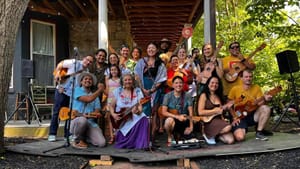Stay in the Loop
BSR publishes on a weekly schedule, with an email newsletter every Wednesday and Thursday morning. There’s no paywall, and subscribing is always free.
Son jarocho for everyone
Music collective Son Revoltura brings Mexican folk traditions to the people of Philly

Son Revoltura has spent the last decade cultivating space for neighbors to connect with history, songs, and each other through the multicultural Mexican folk music tradition of son jarocho. You can find members practicing this style of music and dance everywhere in Philadelphia, from street demonstrations to professional stages to public parks, if you follow the sound of strumming string instruments (jaranas) and shoes tapping on the wooden dancefloor (the tarima).
Ximena Violante, born in Mexico City and raised in Pennsylvania since age seven, co-founded Son Revoltura with Yared Portillo after they both got exposed to other forms of Mexican traditional music during college. The friends began playing jaranas after traveling to gatherings in New York and DC, where other jaraneros marched among protestors, amplifying their political messages, or hosted workshops and fandangos, like jam sessions for participants of all ages and skill levels. Violante felt empowered by these musicians, so they decided to begin organizing similar spaces in Philadelphia “to pay it forward, all that generosity.”
As they started gathering amateur locals to practice son jarocho together, access to instruments became a barrier, because no American companies manufacture jaranas and only a few luthiers build them by hand. Fortunately, Violante and Portillo earned a Leeway Foundation grant in 2014 that helped them purchase a few jaranas and bring veteran jaraneros to Philadelphia to teach the new collective how to build more of their own. The group has grown in scope since then, and now they perform regularly at political rallies, educational events, and Mexican cultural events like the Día de los Muertos celebration on 9th Street in South Philadelphia.
“Open and accepting”
Son Revoltura currently hosts meetups every Tuesday at the Washington Avenue office of the Latine immigrant advocacy organization Juntos. These free workshops (donations optional) are open to all levels of experience. (For meetup details, organizers recommend contacting the group through its Instagram page, @sonrevolturaphilly.) Juntos executive director Erika Guadalupe Nuñez had no musical experience before she began singing and dancing with the collective. “The culture of son jarocho is very open and accepting,” she says.
“Within one workshop, you can pretty easily be able to participate, which is not true in some styles of music,” Violante says, adding that regular participants observe singing feels like “the biggest hurdle” for most novices who attend workshops, because “a lot of us have it ingrained in us that if you’re not a professional, that you can’t sing.” Making the workshops comfortable for beginners requires “this deeper work of showing people that it’s okay to mess up, it’s okay to express yourself. We all have a voice, like a muscle that you can train.”

Along with voices, son jarocho incorporates dancing, called zapateado, jaranas, and other string and percussion instruments that trace back to Veracruz, Mexico, where the musical style originated among West African and Indigenous people during Mexico’s colonial period. “Una musica campesina,” Violante stresses, means a music “made by people who were working the land: farm workers, fishermen.” The instruments reflect this history because their shapes fit “rugged, farm-working hands,” and they resonate loudly in open spaces without electric amplification. Son Revoltura practices these instruments developed by campesinos, but “even if we wanted to play the same as they do, the cultural context is different.” Philadelphians have different working conditions, and “brutal winters” prevent outdoor gatherings—in Veracruz, fandangos can last all night.
Making the music their own
The collective embodies son jarocho differently than the oldest jaraneros also because “a lot of us leading it are queer and trans,” Violante shares proudly. Some tunes, or sones, traditionally expect only women dancers, or only man/woman couples, but Son Revoltura supports Philadelphia jaraneros in expressing themselves through whichever sones feel right for them. Plus, “those rules are already getting bent in Veracuz.”
Regulars also rewrite traditional verses to address current events when they perform in public, which “shows how it’s still a living tradition, to reflect the struggles that the group is engaged in supporting,” Nuñez points out. The group has sung pro-Palestine verses, repurposed a tune titled “Señor Presidente” as “Señora Alcaldesa” (“Madam Mayor”), and contributed a version of “La Bamba” to the Save Chinatown rallies in 2024. “Ay abajo y abajo la construcción, no queremos estadio en Chinatown” (“Down, down with the construction, we do not want an arena in Chinatown”).
Life-giving music
Violante, Nuñez, and the other musicians who spoke with me—Alejandro Utria, Christopher Thornton, Lenin Antunish—described their experiences learning and transforming sones with Son Revoltura as “life-giving” in today’s context. Violante says the tradition celebrates “the deep African and Indigenous roots that also teach us different ways of seeing the world and different ways of coming together. That’s powerful in this day and age, where we need other models of how to exist.”
Son Revoltura will perform at West Philly Porchfest on Saturday, May 31. Next up, the group will lead a fandango at the Mann Center on Wednesday, June 4, for A Taste of Home with Chef Cristina Martinez. To learn more, find the collective on Instagram at @sonrevolturaphilly or join its Facebook group Philly son jarocho.
Sign up for our newsletter
All of the week's new articles, all in one place. Sign up for the free weekly BSR newsletters, and don't miss a conversation.

 Thomas Hagen
Thomas Hagen